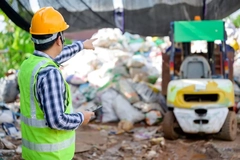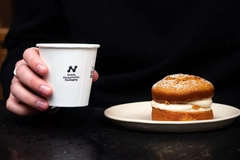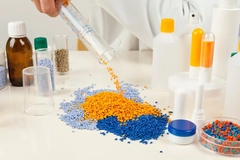Interpack 2020: Sealpac to feature resource-saving trays and monomaterial packaging

11 Mar 2020 --- Sealpac, a thermoforming technology specialist, will be showcasing several resource-saving solutions at interpack 2020. The trade show set to be held in Dusseldorf, Germany, from May 7 to 13, provides an ideal platform for Sealpac to present its paper-based eTray packaging and ultra-thin trays that minimize plastic usage. The company will also feature its material and energy savings facilitated by its RE25 thermoformer.
Sealpac exemplifies how modern packaging systems can contribute to environmental and climate protection while meeting the requirements of the latest EU plastic regulations. “[Recycling and monomaterial] are what the market is demanding. EU and national regulations force the industry to reduce plastics and increase recycling rates. Most, if not all retailers, have implemented that in their latest packaging guidelines for their suppliers. Sealpac’s innovations signal to the packaging industry that they can live up to those regulations, yet still offer packaging that is functional and reduces food waste,” Marcel Veenstra, Marketing and Communications Manager at Sealpac, tells PackagingInsights.
Less plastic, more communication
Sealpac’s latest addition in the Modified Atmosphere Packaging (MAP) segment came with its eTray launch last year. At interpack 2020, the company will show that the eTray can now also be supplied with a mono PP inlay, addressing the latest guidelines of food retailers regarding sustainable packaging materials.
“In general, PP is more difficult to form than PET. This has to do with the shrinkage behavior of the material. It requires a thermoformer with excellent forming capabilities, for example equal forming pressure, which is what we offer on our RE-series,” Veenstra details.
With a capacity up to 15 cycles per minute, the A6 traysealer is ideal for fresh products with varying production runs.
Suitable for a wide range of fresh food products, the tray consists of a high-quality cardboard base, which can be fully printed on the inside and outside. It has a thin plastic inner layer, also made from mono PP, that purely provides the sealing and barrier function. Each tray is then sealed under MAP to ensure the safest packaging process.
Compared to conventional trays in the market, eTrays use up to 40 percent less plastic, depending on shape and size. After use, the inlay and lightweight cardboard base are easily separated from each other, allowing for optimal recycling of paper and plastic waste.
A6 Traysealer
Sealpac will be demonstrating the eTray packaging system on its A6 Traysealer that comes with low-wear servo drive and efficient energy use. “Compared to pneumatic systems, servo-driven equipment requires less maintenance due to lower wear and tear of the parts. By using servo instead of pneumatics, we do not require any consumption of compressed air,” Veenstra explains.
Moreover, A-series traysealers are the only current market-available units that are completely lubrication-free. “It is about the components that we use in our machines. By choosing a specific design for our lifting systems and film (un)winding systems, no lubrication is required.”
Ultra-thin trays to reduce plastic waste
Another Sealpac event highlight will be its ultra-light trays produced from mono PP or mono PET. In partnership with various tray manufacturers, Sealpac reduced the weight of the most commonly used MAP tray for fresh meat in Europe (190 x 144 x 50 mm) from 18 grams in 2003 to well under 10 grams today. Despite their low weight, the processing stability of these trays on Sealpac’s A series traysealers is guaranteed, even in high-output applications such as for minced meat.
In terms of durability, the ultra-thin trays perform just as well as thicker trays, Veestra maintains. However, the challenges lie not so much in their potential breaking, but more in the way they are handled on a fully automatic packaging line. “Due to their low weight, the [empty ultra-thin] trays tend to bounce more. Upon reaching the sealing station, they will be collected by grippers to be pulled into the tooling. The lighter the trays, the bigger the risk of the grippers damaging the tray walls. Due to our servo-drive and the durable construction of our traysealers, we are able to control that process fully.”
The RE25 thermoformer also tailors to oddly shaped, rigid film packaging and all types of labeling systems.Thermoformed packs
Sealpac has achieved substantial material and energy savings through its RE25 Thermoformer. The company will present its thermoformed, recyclable monoplastic pack for cheese blocks, mainly made from PP, with small traces of PE for pack peelability and reclosability, as well as EVOH for barrier purposes. “But it’s in such a small percentage that the film itself remains recyclable,” Veenstra assures. The C-base bottom film, manufactured by Schur Flexibles, is made from mono PP and combined with a recyclable top film. These solutions are also suitable for other fresh food items, packaged with MAP.
Alongside the Rapid Air Forming system, the company’s RE25 Thermoformer allows for perfect forming without the use of stamps. “Having to use stamps means additional costs and potential maintenance, or downtime. We solve this issue with our unique Rapid Air Forming system that works on any of our standard thermoformers,” Veenstra outlines.
Moreover, by using more air, instead of just vacuum pressure, and less ventilation, the company can achieve faster and more consistent forming. This also facilitates the use of up to 10 percent thinner films, due to improved forming consistency, particularly in the corners of the pack. In terms of product changes, the company affirms that the RE25 Thermoformer allows for “maximum flexibility” and “minimum effort.”
At interpack 2020, Veenstra states that “offering sustainable solutions for any market segment” will help Sealpac stand out from the competition. “Some concepts, such as hybrid packs containing both cardboard and plastic, will not work for each product. In those cases, we offer plastic solutions, which are fully recyclable. And always with the least amount of materials possible,” he concludes.
By Anni Schleicher










